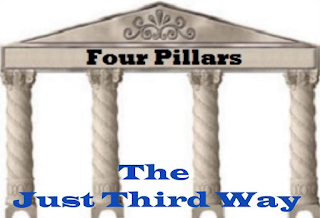As we saw in the previous posting on this subject, we believe it is a fundamental principle of economic personalism that every human being is a person, and as such should be both a producer or creator and a consumer — a binary relationship, integral to personalism itself. The right to consume is rarely questioned (at least out loud), but what doesn’t seem to cross people’s minds is the need for everyone to be productive. Each person should have access to the means of employing both labor and capital to do so.
Every person should therefore be both an owner of labor and an owner of capital. By proposing to redistribute what some produce for the benefit of others who do not produce as a solution instead of as a temporary expedient, the Great Reset and similar proposals would throw the system out of balance and offend against essential human dignity at the same time and by the same operation.
It comes as no surprise then, in contrast to the Great Reset and similar proposals, the holistic paradigm we call the Just Third Way is binary in character. Having the goal of making it possible for every person to produce as well as to consume, the Just Third Way is a free-market system that economically empowers all individuals and families. This is through the democratization of money and credit for new production, with universal access to direct ownership of income-producing capital.
 |
| Why not "Old and Proved"? |
Admittedly, people can be excused for believing that “third way” means no more than Madison Avenue’s “new and improved” slogan so beloved of advertisers, politicians, and proponents of Great Resets. Quite a few systems have been labeled third ways. Without exception, however, these have turned out to be variations on capitalism or socialism that either tend to Belloc’s Servile State or differ from it only in name and unimportant details.
Not unexpectedly, third ways turn out that way if they accept the same assumptions. This is even though getting away from the whole either-capitalism-or-socialism dead end opens an entirely new range of possibilities.
Nevertheless, convincing socialists, capitalists, and moral relativists to question their basic assumptions is difficult. They tend to turn absolutist when it comes to giving the binary character of personalism fair consideration. For them, something tends to be either one thing or another, not both. This leads to what from a personalist viewpoint are ludicrous conclusions:
 |
| If capital produces nothing, why do we need it? |
· Production is due exclusively to labor; capital at best only enhances labor or (as Keynes asserted) merely provides the environment within which labor becomes productive. Workers do not own, owners do not work.
· Wages and welfare are the only legitimate forms of income.
· Only past reductions in consumption, never future increases in production, can be used to finance new capital formation and widespread ownership.
· Any arrangement other than capitalism, socialism, or the Servile State is impossible.
Thus, when Leo XIII proposed an alternative that was neither capitalist nor socialist, but personalist, and Chesterton and Belloc attempted to apply it, at least in theory, it fell on deaf ears. Neither was Fulton Sheen any more successful when he emphasized in many of his books the importance of widespread ownership to Catholic social teaching, e.g.,
 |
| Pope Leo XIII |
Presently, we are concerned with property in relation to freedom. Because the ownership of external things is the sign of freedom, the Church has made the wide distribution of private property the cornerstone of her social program. There are three possible solutions of the problem of property. One is to put all the eggs into a few baskets, which is Capitalism; the other is to make an omelet out of them so that nobody owns, which is Communism; the other is to distribute the eggs in as many baskets as possible, which is the solution of the Catholic Church. Or to characterize them differently: selfish possession (Capitalism); personal dispossession with collective selfishness (Communism); diffused possession (Catholicism). (Fulton J. Sheen, Freedom Under God. Arlington, Virginia: Economic Justice Media, 2013, 33.)
We would say socialism instead of communism, and personalism instead of Catholicism, but that is mere semantics. It does not change Sheen’s meaning — that widespread private property in capital is essential to a just society.
This was precisely what Leo XIII said in Rerum Novarum immediately after declaring that “as many as possible of the people [should be induced to] become owners.” (Rerum Novarum, § 46.) Reiterating that “[t]he right to possess private property is derived from nature, not from man,” (Ibid., § 47.) the pope listed three primary benefits of widespread capital ownership:
· Ownership will become more equitably divided, bringing together people now separated by disparities in wealth (Ibid.),
· Because people pay more attention to what they own, production will increase, providing abundance for all (Ibid.), and
· People will no longer be forced to leave their own countries to seek a better life. (Ibid.)
There was still something missing, however. All these initiatives and others besides failed to address adequately the problem of financing widespread capital ownership — which is what we will look at in the next posting on this subject.
#30#


